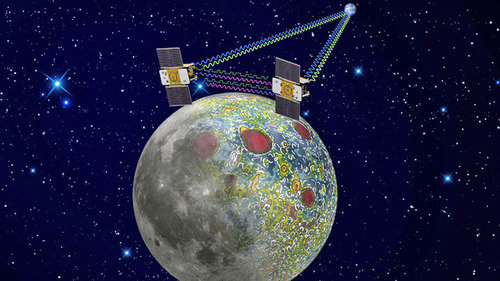Light and safety, and low cost, were all great features of Edison’s light bulbs.
But come January 1, when a light-bulb law setting new efficiency standards is set to take effect, it’s out with those old incandescents and in with the new. My great grandfather’s 100-watt incandescent will be replaced with new energy-efficient versions, including CFLs, LEDs, and — yes — new and improved incandescent bulbs. When better lighting is fully implemented throughout our country, we’ll be saving $13 billion a year in electricity costs and we’ll eliminate the need for 30 large power plants, according to the Natural Resources Defense Council, an environmental advocacy group.
Via edition.cnn.com
Edison would’ve loved new light bulb law
Hackers prepare space satellites
Never get in the way of a hobbyist, we always say!
=======Computer hackers plan to take the internet beyond the reach of censors by putting their own communication satellites into orbit.The scheme was outlined at the Chaos Communication Congress in Berlin.The project’s organisers said the Hackerspace Global Grid will also involve developing a grid of ground stations to track and communicate with the satellites.Longer term they hope to help put an amateur astronaut on the moon.Hobbyists have already put a few small satellites into orbit – usually only for brief periods of time – but tracking the devices has proved difficult for low-budget projects.The hacker activist Nick Farr first put out calls for people to contribute to the project in August. He said that the increasing threat of internet censorship had motivated the project.”The first goal is an uncensorable internet in space. Let’s take the internet out of the control of terrestrial entities,” Mr Farr said.
Via www.bbc.co.uk
Elderly can be as fast as young in some brain tasks, study shows
Both children and the elderly have slower response times when they have to make quick decisions in some settings. But recent research suggests that much of that slower response is a conscious choice to emphasize accuracy over speed.
In fact, healthy older people can be trained to respond faster in some decision-making tasks without hurting their accuracy — meaning their cognitive skills in this area aren’t so different from younger adults.
“Many people think that it is just natural for older people’s brains to slow down as they age, but we’re finding that isn’t always true,” said Roger Ratcliff, professor of psychology at Ohio State University and co-author of the studies.
“At least in some situations, 70-year-olds may have response times similar to those of 25-year olds.”
Via www.sciencedaily.com
Print me a Stradivarius
THE industrial revolution of the late 18th century made possible the mass production of goods, thereby creating economies of scale which changed the economy—and society—in ways that nobody could have imagined at the time. Now a new manufacturing technology has emerged which does the opposite. Three-dimensional printing makes it as cheap to create single items as it is to produce thousands and thus undermines economies of scale. It may have as profound an impact on the world as the coming of the factory did.It works like this. First you call up a blueprint on your computer screen and tinker with its shape and colour where necessary. Then you press print. A machine nearby whirrs into life and builds up the object gradually, either by depositing material from a nozzle, or by selectively solidifying a thin layer of plastic or metal dust using tiny drops of glue or a tightly focused beam. Products are thus built up by progressively adding material, one layer at a time: hence the technology’s other name, additive manufacturing. Eventually the object in question—a spare part for your car, a lampshade, a violin—pops out. The beauty of the technology is that it does not need to happen in a factory. Small items can be made by a machine like a desktop printer, in the corner of an office, a shop or even a house; big items—bicycle frames, panels for cars, aircraft parts—need a larger machine, and a bit more space.
Via www.economist.com
Five tech industry predictions for 2012
The really big Internet IPO returned and the massive venture capital funding bubble inflated, which seems difficult considering that the venture capital industry is far smaller than it was three years ago. But look at some of the crazy valuations on revenue-less photo-sharing startups like Color and Path. And there is clearly another bubble inflating in the cloud computing sector, with every company that uses a distributed architecture now calling itself a “cloud company.†So what does 2012 have in store? Here are my predictions.
Via venturebeat.com
NASA spacecraft enters moon’s orbit
A NASA spacecraft fired its engine and slipped into orbit around the moon Saturday in the first of two back-to-back arrivals over the New Year’s weekend.Ground controllers at the NASA Jet Propulsion Laboratory erupted in cheers and applause after receiving a signal that the probe was healthy and circling the moon. An engineer was seen on closed-circuit television blowing a noisemaker to herald the New Year’s Eve arrival.”This is great, a big relief,” deputy project scientist Sami Asmar told a roomful of family and friends who gathered at the NASA center to watch the drama unfold.
Via www.cbc.ca
The perfect Xmas food gift: edible bling
I love a good piece of food that looks like gold or silver. Ok, not really, but if I did I’d buy a shed-load of this allegedly harmless and edible bling spray to coat my Tim Tams and Zooper Doopers in:

For those worried about ingredients, it contains all these ‘harmless’ sounding things: Ethanol, Butane-E943a, Isobutane – E943b, Propane-E944, E555(Potassium aluminium silicate), E171 (Titanium Dioxide), E172 (Iron Oxides and Hydroxides)
So there you go – why eat another non-gold or silver piece of toast? You know it makes sense.
Have genital herpes? Read this
 Great to see Aussie innovation delivering some benefits to society as a whole. If you’ve got herpes, you don’t need me to tell you how awful it can be, let alone the infection risk to others. Even better, the company are touting that it may actually help current herpes sufferers. Here’s hoping!
Great to see Aussie innovation delivering some benefits to society as a whole. If you’ve got herpes, you don’t need me to tell you how awful it can be, let alone the infection risk to others. Even better, the company are touting that it may actually help current herpes sufferers. Here’s hoping!
University start-up research results offer hope for herpes sufferers
Coridon Pty Ltd, a University of Queensland (UQ) start-up company established to commercialise Professor Ian Frazer’s work in developing next generation DNA vaccines, has successfully completed pre-clinical efficacy testing of its prototype Herpes Simplex Virus 2 (HSV-2) vaccine, with outstanding results. The company will now look to progress the program into clinical studies.
Collaborating with Professor David Koelle and his colleagues at the University of Washington in Seattle, Coridon tested a number of different formulations of Coridon’s prototype vaccine. These proved 100% effective at protecting animals against HSV-2 infection, confirming an earlier study with the University of Washington which also demonstrated 90-100% protection against infection. These results were presented at the 5th Vaccine and ISV Annual Global Congress in Seattle earlier this month.
Coridon has now secured additional funding from major investor Allied Heal thcare Group (ASX: AHZ) to begin manufacturing the vaccine and conduct pre-clinical safety studies before testing the vaccine in a Phase I clinical study.
“The results of our herpes vaccine mark the beginning of an exciting period,” said Professor Frazer.
“Over the next 12 months, we expect pivotal data showing that our HSV vaccine, which incorporates Coridon optimisation technology, produces similar immune responses in the clinic to those seen in the animal trials.â€
Working at UQ Diamantina Institute, Coridon is developing DNA vaccines for the prevention and treatment for a range of infectious diseases and cancers in humans, utilising the company’s patented technology.
David Henderson, Managing Director of UQ’s main commercialisation company, UniQuest Pty Limited, said Coridon’s recent results and support from investors such as Allied Healthcare Group demonstrated the valuable contribut ion Australian university-based research is having on concerted efforts to address a global health challenge and on Queensland’s reputation in the biotechnology industry.
“Coridon’s DNA vaccine technologies differ from conventional vaccines in that they offer both preventative and therapeutic value,†Mr Henderson said.
“With extremely common infections such as HSV-2, pre-clinical results like this offer hope to people suffering from the pain and fear of spreading the contagion, as well as to governments looking to ease the enormous economic burden – it’s costing larger countries like the US more than $1 billion a year to manage.
“Collaborating with other universities to find a preventative and therapeutic solution, and partnering with companies like Allied Healthcare, will help Professor Frazer and his research team translate their ideas into a vaccine much sooner,†Mr Henderson said.
Allied Healthcare Group’s Managing Director, Mr Lee Rodne, said: “These data provide fantastic validation to the Coridon platform which could be applied to a number of infectious diseases. We are excited about the path forward for the program as it moves toward clinical studies.â€
Professor Frazer’s work at Coridon follows the success of his discovery with the late Dr Jian Zhou of a basis for a cervical cancer vaccine (Gardasil), which was also commercialised by UniQuest.











Recent Comments